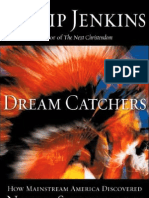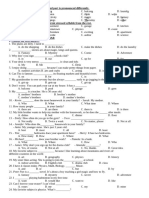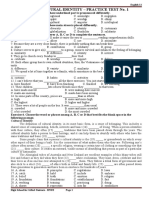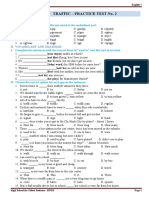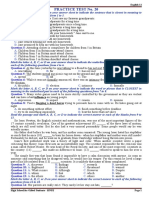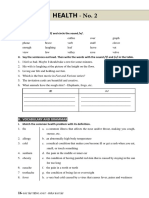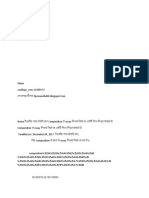0 ratings0% found this document useful (0 votes)
9 viewsPractice Test No. 16: A. B. C. D. A. B. C. D. A. B. C. D. A. B. C. D
Practice Test No. 16: A. B. C. D. A. B. C. D. A. B. C. D. A. B. C. D
Uploaded by
nguyen ngaThe document describes a practice test for English with multiple choice questions covering topics like grammar, vocabulary, and reading comprehension. It contains 19 questions testing different English language skills. The test aims to evaluate students' proficiency in various areas of the English language.
Copyright:
© All Rights Reserved
Available Formats
Download as DOC, PDF, TXT or read online from Scribd
Practice Test No. 16: A. B. C. D. A. B. C. D. A. B. C. D. A. B. C. D
Practice Test No. 16: A. B. C. D. A. B. C. D. A. B. C. D. A. B. C. D
Uploaded by
nguyen nga0 ratings0% found this document useful (0 votes)
9 views4 pagesThe document describes a practice test for English with multiple choice questions covering topics like grammar, vocabulary, and reading comprehension. It contains 19 questions testing different English language skills. The test aims to evaluate students' proficiency in various areas of the English language.
Original Title
9. Revision No.16(33 ban)
Copyright
© © All Rights Reserved
Available Formats
DOC, PDF, TXT or read online from Scribd
Share this document
Did you find this document useful?
Is this content inappropriate?
The document describes a practice test for English with multiple choice questions covering topics like grammar, vocabulary, and reading comprehension. It contains 19 questions testing different English language skills. The test aims to evaluate students' proficiency in various areas of the English language.
Copyright:
© All Rights Reserved
Available Formats
Download as DOC, PDF, TXT or read online from Scribd
Download as doc, pdf, or txt
0 ratings0% found this document useful (0 votes)
9 views4 pagesPractice Test No. 16: A. B. C. D. A. B. C. D. A. B. C. D. A. B. C. D
Practice Test No. 16: A. B. C. D. A. B. C. D. A. B. C. D. A. B. C. D
Uploaded by
nguyen ngaThe document describes a practice test for English with multiple choice questions covering topics like grammar, vocabulary, and reading comprehension. It contains 19 questions testing different English language skills. The test aims to evaluate students' proficiency in various areas of the English language.
Copyright:
© All Rights Reserved
Available Formats
Download as DOC, PDF, TXT or read online from Scribd
Download as doc, pdf, or txt
You are on page 1of 4
English 12
PRACTICE TEST No. 16
Mark the letter A, B, C, D on your answer sheet to indicate the word whose underlined part differs from
the other three in each of the following questions.
Question 1: A. farmers B. apples C. wallets D. handbags
Question 2: A. birth B. slice C. file D. time
Mark the letter A, B, C, D on your answer sheet to indicate the word that differs from the other three in
the position of primary stress in each of the following questions.
Question 3: A. order B. demand C. explore D. invite
Question 4: A. volunteer B. invention C. phonetics D. computer
Mark the letter A, B, C, D on your answer sheet to indicate the correct answer to each of the following
questions.
Question 5: Neither of them will be treated preferentially,_______________?
A. will them B. won’t them C. will they D. won’t they
Question 6: These T-shirts and jeans_____________in the US. in 1900.
A. have made B. made C. were made D. make
Question 7: The weather is very fine today. Let's go this afternoon.
A. climb B. to climb C. climbing D. climbed
Question 8: She sat there quietly, but during all that time she was getting ________________. Finally, she
exploded.
A. more and more angry B. the more angry
C. angrier and angrier D. the most angry
Question 9: Visitors to the local museum are mostly attracted by____________rocking chair.
A. an old wooden European beautiful B. a beautiful old European wooden
C. an old beautiful wooden European D. a wooden old beautiful European
Question 10: So far they___________very hard day and night in search for new products.
A. have been working B. are working C. had been working D. work
Question 11:_____________it was raining heavily, he went out without a raincoat.
A. Because B. Because of C. Despite D. Although
Question 12: Please don't touch anything_________________.
A. until the police will come C. before the police come
B. when the police came D. right after the police would come
Question 13: If you____________to my advice, you wouldn’t be in this situation now.
A. listened B. had listened C. listen D. were listening
Question 14: They eventually realize that reckless_____________of the earth’s resources can lead only to
eventual global disaster.
A. exploit B. exploitable C. exploitation D. exploitative
Question 15: Vi-Dam singing, two kinds of folk music from Nghe An and Ha Tinh province, has been to
generations and is still very much alive today.
A. handed down B. landed on C. passed by D. taken over
Question 16: The pointless war between the two countries left thousands of people dead and
seriously__________.
A. injured B. wounded C. spoilt D. damaged
Question 17: The president____________tribute to all the people who had supported him.
A. made B. paid C. gave D. told
Question 18: Eager to be able to discuss my work_____________in French, I hired a tutor to help polish my
language skills.
A. expressively B. articulately C. ambiguously D. understandably
Question 19: She is a rising star as a standup comedian, always able to bring down the____________
during each performance.
A. house B. rain C. roof D. kennel
Mark the letter A, B, C, or D on your answer sheet to indicate the word(s) CLOSEST in meaning to the
underlined word(s) in each of the following questions.
Question 20: There is an increase in the prevalence of electronic books as more people are turning to
digitalised reading materials.
A. deficiency B. intensity C. popularity D. scarcity
High School for Gifted Students - HNUE Page 1
English 12
Question 21: On Saturday wearing uniforms is optional so I often choose T-shirt and shorts.
A. compulsory B. voluntary C. uncomfortable D. acceptable
Mark the letter A, B, C, or D on your answer sheet to indicate the word(s) OPPOSITE in meaning to the
underlined word(s) in each of the following questions.
Question 22: The research findings were reliable since modern technology was used to increase the
precision of the sampling procedure.
A. inaccuracy B. exactness C. insecurity D. flexibility
Question 23: I’m all in favor of ambition but I think when he says he’ll be a millionaire by the time he’s 25,
he’s simply crying for the moon.
A. longing for what is within the reach B. regretting for the moon
C. doing something with vigorous intensity D. crying a lot and for a long time
Mark the letter A, B, C, or D on your answer sheet to indicate the option that best complete each of the
following exchanges.
Question 24: Linda is thanking Daniel for his birthday present.
- Linda: “Thanks for the book. I've been looking it for months.” - Daniel: “_____________”
A. Thank you for looking for it. B. You can say that again.
C. I'm glad you like it. D. I like reading books.
Question 25: Lucy and Jack are talking about their school days.
- Lucy: "I think school days are the best time of our lives."
- Jack: "____________. We had sweet memories together then."
A. Absolutely B. That's nonsense C. I'm afraid so D. I doubt it
Read the following passage and mark the letter A, B, C, or D on your answer sheet to indicate the correct
word or phrase that best fits each of the numbered blanks from 26 to 30.
Many groups worldwide are trying to develop vaccines that protect against a wide range of coronaviruses
and prevent (26)_________pandemic. These efforts have now been boosted by the discovery that some
healthcare workers had pre-existing immunity to the SARS-CoV-2 virus during the first wave of the
pandemic. During the first half of 2020, around 700 healthcare workers in the UK were tested weekly as part
of a crowdfunded study called Covid Sortium. Most of these people, who wore protective equipment, never
tested positive for covid-19 in PCR tests or developed covid-19 antibodies - proteins that (27)_________to
the outside of viruses, preventing cells from being infected. (28)__________, when Leo Swadling and Mala
Maini at University College London and their colleagues looked more closely, they found some of those
(29)____________tested negative had a protein in their blood that is linked to covid-19 infection, as well as
T cell responses to the SARS-CoV-2 virus. T cells are (30)_________of the immune system.
Adapted from https ://www. new scientist, com/
Question 26: A. other B. another C. many D. much
Question 27: A. bind B. respond C. connect D. abide
Question 28: A. Therefore B. Moreover C. However D. Because
Question 29: A. where B. whose C. whom D. who
Question 30: A. part B. piece C. slice D. lot
Read the following passage and mark the letter A, B, C, or D on your answer sheet to indicate the correct
answer to each of the questions from 31 to 35.
The Amazing Race (TAR) is a popular reality TV show. Elise Doganieri and Bertram van Munster
created it in 2001 and since then it has won many awards. In the show, teams travel around the world to
different places. They try to arrive first, or at least not come last and they also try to win prizes on their
journey.
Every year, between 10 and 12 teams play on the show. There are two people in each team and they must
know each other before they come on the game. For example, they can be husband and wife, parents and
children, friends, etc. They have to travel to different countries and work together on the journey. The teams
get some money at the beginning of the race and they use it to buy food, tickets, etc. They can use planes,
trains, bikes or even skis to travel.
The teams explore places they’ve never been to before and have games or ‘challenges’. These challenges
have some connection to the country they are in and can be things like riding a camel, solving puzzles or
eating a lot of food, for example. The teams often have to face extreme weather conditions during their
journey. Many times they are outside in the rain or snow or in storms and get cold and wet. It’s all part of
the experience, though.
High School for Gifted Students - HNUE Page 2
English 12
Each week, one team leaves the show, and in the end there are only four teams. The first team to get to
the last city on the journey wins the game. TAR is a very hard game and the teams become really stressed,
but it’s an amazing experience.
Adapted from https://meaww.com/
Question 31: Which best serves as the title for the passage?
A. Tips for teams to win the race. B. A hard race for all teams to win.
C. Places for teams to arrive. D. A successful reality show.
Question 32: The word “created” in paragraph 1 is closest in meaning to____________.
A. watched B. played C. made D. decorated
Question 33: According to the passage, how many players are there on the show?
A. between 10 and 12 B. between 20 and 24
C. 22 D. 44
Question 34: What does the word “They” in the second paragraph refer to?
A. tickets B. trains C. teams D. countries
Question 35: Which of the following difficulties does the writer mention?
A. wild animals B. bad weather C. strange food D. late trains
Read the following passage and mark the letter Ay By Cy or D on your answer sheet to indicate the
correct answer to each of the questions from 36 to 42.
Whether they’re cheering in the stadium, yelling at the referee from the sofa, or singing thier team’s
victory song, sports fans exist all over the world. The long-term attchment to a particular sport or team
appears to develop around the age of eight or nine, and the sport or team a person decides to follow is
largely influenced by their social circle rather than their personal participation in a sport. Research into the
psychology of sports fans has revealed some common principles that apply to the behaviour of most fans.
Have you ever heard a sports fan boasting, ‘We thrashed the other team today!’ or ‘We are top of the
league at the moment’? Clearly the fan was not personally involved in achieving either success, yet they use
the pronoun ‘we’ to report their team’s performance. Fans’ use of ‘us’ and ‘we’ to talk about their favourite
team is common behaviour. It demonstrates the strong sense of identity fans feel great and enjoy
experiencing the victory as if they had played a part in the success themselves.
The opposite of this often happens after a team suffers a defeat. Fans in this case may refer to the team as
‘they’ in order to distance themselves from their team’s disappointing match result. A dissatisfied fan is
more likely to say ‘they played really badly’ as they want no responsibility for the depressing final score.
Furthermore, they will be unlikely to wear any clothing that pinpoints them as a supporter after losing to a
rival team. However, research shows that this is not the case with fiercely loyal or ‘true’ fans. They will
carry on wearing their team scarf even when their team performs badly and will say with genuine sadness,
‘they beat US three nil’.
Finally, and perhaps most interestingly, is the way in which sports fans swear by their superstitions or
lucky charms. Wearing a certain item of clothing or carrying a lucky object is common practice of many.
People who may not be superstitious in other aspect of their life will claim that wearing a certain item of
lucky clothing will make their team play better. Equally, an action performed while the team lost will be
considered bad luck and will be avoided in future for fear of jinxing the team. Of course in reality it makes
no difference what kind of hat you wear or whether you have your lucky coin, but superstitions are taken
very seriously by sports fans and I for one would not like to try and persuade them otherwise.
Adapted from Gold experience by Kathryn Alevizos, Suzane Gaynar & Megan Rodeck
Question 36: Which best serves as the title for the passage?
A. Sports fans B. Superstitions
C. Success and failure in sports D. True sports fans
Question 37: According to the first paragraph, what does writer say about children?
A. Children are more likely to become sports fans than adults.
B. Playing a sport is seldom the main factor in choosing a team to support.
C. Children are too easily influenced by friends and family.
D. A child experiences important developments at the age of eight or nine.
Question 38: What does the word “it” in the second paragraph refer to?
A. fans’ favourite team B. fans’ use of ‘us’ and ‘we’
C. odd behaviour among fans D. the sense of identity fans with their club
Question 39: Which of the following is TRUE about true fans in paragraph three?
High School for Gifted Students - HNUE Page 3
English 12
A. They are more willing to show their true feelings than less loyal fans.
B. Their mood is more affected by the success and failures of their team.
C. They are unlikely to change the way they report their teams’ results.
D. They are critical of the way some fans only support successful teams.
Question 40: The word “thrashed” in paragraph 2 is closest in meaning to____________
A. abolished B. hit C. lost D. defeated
Question 41: The word “jinxing” in paragraph 4 is closest in meaning to
A. joining in B. backing up
C. bringing good fortune D. bringing bad luck
Question 42: What can be inferred about the writer’s attitude towards fans’ superstitions and rituals?
A. He recognises the benefits of fans having their personal superstitions and rituals.
B. He is doubtful of their positive effect but would be reluctant to share his opinion with a fan.
C. He makes fun of the way some people let superstitions influence their decisions in life
D. He criticises the belief of many fans that their actions can affect the performance of their team.
Mark the letter A, B, C, or D on your answer sheet to indicate the underlined part that needs correction in
each of the following questions.
Question 43: Yesterday morning, it takes me two hours to repaint my bedroom and decorate the living
room.
A. morning B. takes C. repaint D. decorate
Question 44: Either you or the headmaster are handing the prizes to these gifted students at the meeting.
A. Either B. are C. to D. gifted
Question 45: Transgender people are denied the ability to join the armed forces due to discriminating
policies implemented by the government.
A. Transgender B. are denied C. armed forces D. discriminating
Mark the letter A, B, C, or D on your answer sheet to indicate the sentence that is closest in meaning to
each of the following questions.
Question 46: The last time I visited that village was 7 years ago.
A. I have visited that village for 7 years.
B. I didn’t visit that village 7 years ago
C. I have never visited that village for 7 years ago.
D. I haven’t visited that village for 7 years.
Question 47: "I'm sorry I forgot your birthday," he told me.
A. He complained that I forgot his birthday.
B. He refused to go to my birthday party.
C. He begged me to forget my birthday.
D. He apologized for having forgotten my birthday.
Question 48: John is not here, perhaps he is ill.
A. Because of his illness, John shouldn't have been here.
B. John might be ill, so he is not here.
C. John must be ill, so he is not here.
D. John needn't be here because he is ill.
Mark the letter A, B, C, or D on your answer sheet to indicate the sentence that best combines each pair
of sentences in the following questions.
Question 49: Disabled people can contribute to our community. Non-disabled people can also contribute to
our community.
A. Neither disabled people nor non-disabled ones can contribute to our community.
B. Only disabled people not non-disabled ones can contribute to our community.
C. Both disabled people and non-disabled ones can contribute to our community.
D. Either disabled people or non-disabled ones can contribute to our community.
Question 50: We arrived at the conference. Then we realized that our reports were still at home.
A. No sooner had we realized that our reports were at home than we arrived at the conference.
B. Only after we arrived at the conference did we realize that our reports were still at home.
C. Not until we arrived at the conference that we realized that our reports were still at home.
D. Hardly had we arrived at the conference that we realized that our reports were still at home.
High School for Gifted Students - HNUE Page 4
You might also like
- ôn thi Đại học môn Anh PRACTICE TEST 59-62Document18 pagesôn thi Đại học môn Anh PRACTICE TEST 59-62tran Lan PhuongNo ratings yet
- Betting On Yourself by DR Robert AnthonyDocument181 pagesBetting On Yourself by DR Robert Anthonyflyers83100% (5)
- Atestat Engleza British TraditionsDocument20 pagesAtestat Engleza British TraditionsEffy StefiNo ratings yet
- Dream CatchersDocument321 pagesDream CatchersALBERTO GO100% (3)
- Anthropology: Theoretical Practice in Culture and SocietyDocument47 pagesAnthropology: Theoretical Practice in Culture and SocietyFamoo JuniorNo ratings yet
- Student 'S Name Date Placement Conversation RatingDocument3 pagesStudent 'S Name Date Placement Conversation RatingfabioNo ratings yet
- 7. Đề KSCL thi TN THPT lần 1 Sở GD Hà Tĩnh - có giải chi tiếtDocument16 pages7. Đề KSCL thi TN THPT lần 1 Sở GD Hà Tĩnh - có giải chi tiếtDương Thị YếnNo ratings yet
- 2. Đề thi thử tốt nghiệp THPT năm 2021-2022 môn Tiếng Anh - Sở giáo dục và đào tạo Hà Tĩnh Lần 1 (File word có lời giải)Document26 pages2. Đề thi thử tốt nghiệp THPT năm 2021-2022 môn Tiếng Anh - Sở giáo dục và đào tạo Hà Tĩnh Lần 1 (File word có lời giải)Nguyễn Hải LongNo ratings yet
- De Thi Thu Tot Nghiep THPT 2023 de Chuan Cau Truc So 03 (Thang 11.2022)Document6 pagesDe Thi Thu Tot Nghiep THPT 2023 de Chuan Cau Truc So 03 (Thang 11.2022)thungan2022vnNo ratings yet
- ĐỀ 5Document19 pagesĐỀ 5kasu922005No ratings yet
- Ôn ĐH 2Document9 pagesÔn ĐH 2Anh TamNo ratings yet
- Mock Test 119Document4 pagesMock Test 119Ngan Nguyen PhuongNo ratings yet
- Sở Gd&Đt An Giang Đề Thi Thử Tốt Nghiệp Thpt - Năm 2021 Thpt Châu Phú Môn Thi: Anh Văn Đề Thi Thử Số 1Document15 pagesSở Gd&Đt An Giang Đề Thi Thử Tốt Nghiệp Thpt - Năm 2021 Thpt Châu Phú Môn Thi: Anh Văn Đề Thi Thử Số 1Lan Anh NguyễnNo ratings yet
- De On Thi Tot Nghiep THPT Nam 2024 Mon Tieng Anh de 7 203a4cb4d0Document11 pagesDe On Thi Tot Nghiep THPT Nam 2024 Mon Tieng Anh de 7 203a4cb4d0Tiệm Của BeeNo ratings yet
- De Thi Thu Mon Anh Tot Nghiep THPT Nam 2021 Co Dap An So 2Document9 pagesDe Thi Thu Mon Anh Tot Nghiep THPT Nam 2021 Co Dap An So 2Khah TragNo ratings yet
- 19. MH 19-2021- File Word Có Lời Giải Chi TiếtDocument15 pages19. MH 19-2021- File Word Có Lời Giải Chi Tiếtlan nguyenNo ratings yet
- Đề Dự Đoán Số 5-Ngày 09062023-Khóa Cấp Tốc 2k5 Biên Soạn Cô Phạm LiễuDocument7 pagesĐề Dự Đoán Số 5-Ngày 09062023-Khóa Cấp Tốc 2k5 Biên Soạn Cô Phạm Liễungoclinh14112005bnNo ratings yet
- ĐỀ KIỂM TRA KIẾN THỨC MÔN TIẾNG ANH LỚP 12Document5 pagesĐỀ KIỂM TRA KIẾN THỨC MÔN TIẾNG ANH LỚP 12Fam DasNo ratings yet
- ĐỀ THI THỬ THTHPT CỤM TRƯỜNG THÀNH PHỐ NAM ĐỊNH -Mã đề 123Document4 pagesĐỀ THI THỬ THTHPT CỤM TRƯỜNG THÀNH PHỐ NAM ĐỊNH -Mã đề 123Nguyễn Phương LinhNo ratings yet
- De Chinhthuc TiengAnh K18 M408 PDFDocument5 pagesDe Chinhthuc TiengAnh K18 M408 PDFBùi Nhật QuangNo ratings yet
- đề 01Document6 pagesđề 01thanhphuongn2706No ratings yet
- Đề thi thử THPT QG môn Anh trường THPT chuyên ĐH Vinh Nghệ An lần 3 năm 2019 có lời giải chi tiếtDocument25 pagesĐề thi thử THPT QG môn Anh trường THPT chuyên ĐH Vinh Nghệ An lần 3 năm 2019 có lời giải chi tiếtJennifer WatsonNo ratings yet
- Mark The Letter A, B, C, or D On Your Answer Sheet To Indicate The Sentence That Best Completes The Following ExchangesDocument6 pagesMark The Letter A, B, C, or D On Your Answer Sheet To Indicate The Sentence That Best Completes The Following ExchangesNguyễn Thế HiểnNo ratings yet
- B. Migrated C. Pursued D. EmergedDocument6 pagesB. Migrated C. Pursued D. EmergedHuyền MyNo ratings yet
- Đề 2Document4 pagesĐề 2lacnhud9123No ratings yet
- (G12) ĐỀ 11-14Document20 pages(G12) ĐỀ 11-14Lien NguyenNo ratings yet
- CCBook - Đề thi thử THPT QG năm 2020 - Môn Tiếng anh - Đề 19 (Có lời giải chi tiết)Document19 pagesCCBook - Đề thi thử THPT QG năm 2020 - Môn Tiếng anh - Đề 19 (Có lời giải chi tiết)K61 ĐỖ QUỲNH NGUYÊNNo ratings yet
- De 3Document17 pagesDe 3Nguyễn Thị Trà My100% (1)
- ĐỀ 9Document12 pagesĐỀ 9hungtuhuyhangNo ratings yet
- De Cuong HK1 So 2Document4 pagesDe Cuong HK1 So 2๖Dũηɠƙαĭтσυღ ღNo ratings yet
- De Luyen Thi THPT QG 2017Document10 pagesDe Luyen Thi THPT QG 2017Nguyễn Thị Thùy TrangNo ratings yet
- De Thi Hoc Ki 1Document6 pagesDe Thi Hoc Ki 1thuNo ratings yet
- MT 6 Code 423 CTNL2Document4 pagesMT 6 Code 423 CTNL2Dung HoangNo ratings yet
- TH I Gian Thi: 21h30 - 22h30 Ngày 25/2/2023Document8 pagesTH I Gian Thi: 21h30 - 22h30 Ngày 25/2/2023Nguyễn HânNo ratings yet
- ĐỀ 6 MegaDocument6 pagesĐỀ 6 MegangolethaovyNo ratings yet
- Test1-2 Ki 2 Khoi 10Document7 pagesTest1-2 Ki 2 Khoi 10Nguyễn Hải PhongNo ratings yet
- ANH 12 Ma de 401Document4 pagesANH 12 Ma de 401Kỳ KhươngNo ratings yet
- De Thi Thu Tuyen Sinh Vao Lop 10 Mon Tieng Anh Nam 2024 2025 Truong Thcs Chu Van An Thai Nguyen 0022Document6 pagesDe Thi Thu Tuyen Sinh Vao Lop 10 Mon Tieng Anh Nam 2024 2025 Truong Thcs Chu Van An Thai Nguyen 0022nguyenle26072009No ratings yet
- De Thi Thu THPT Quoc Gia 2022 Mon Anh Lan 1 So GD DT Thai BinhDocument10 pagesDe Thi Thu THPT Quoc Gia 2022 Mon Anh Lan 1 So GD DT Thai Binhle ngoc tramNo ratings yet
- MOCK-TEST-29Document4 pagesMOCK-TEST-29hoangkimhung193No ratings yet
- Consolidation Test (12) : NameDocument5 pagesConsolidation Test (12) : NameBích Ngân NguyễnNo ratings yet
- 3 de On DH - YenDocument17 pages3 de On DH - Yenpham minh luanNo ratings yet
- Mock Test 30Document6 pagesMock Test 30Quynh NguyenNo ratings yet
- Thithutotnghiepl 1Document5 pagesThithutotnghiepl 129: Lê Đức Minh QuânNo ratings yet
- (Đề thi có 05 trang) Thời gian làm bài: 60 phút, không kể thời gian phát đềDocument5 pages(Đề thi có 05 trang) Thời gian làm bài: 60 phút, không kể thời gian phát đềHana DingNo ratings yet
- Phan Chau TrinhDocument5 pagesPhan Chau TrinhNgọc TrầnNo ratings yet
- ĐỀ PHÁT TRIỂN TỪ ĐỀ MINH HỌA SỐ 21Document4 pagesĐỀ PHÁT TRIỂN TỪ ĐỀ MINH HỌA SỐ 21Ngo Ba ThangNo ratings yet
- Ma_de_105Document4 pagesMa_de_105Hương NguyễnNo ratings yet
- Đề Chuẩn Tiếng Anh 2020 - Đề 8Document11 pagesĐề Chuẩn Tiếng Anh 2020 - Đề 8moonmood11906No ratings yet
- ĐỀ TIÊN TRI CHỮA LIVE 2Document6 pagesĐỀ TIÊN TRI CHỮA LIVE 2lannguyen.31221026069No ratings yet
- 7. CUỐI KI 1 SAMPLE 7Document4 pages7. CUỐI KI 1 SAMPLE 7vtnga1605No ratings yet
- DE CHUAN MINH HOA 2021 - NGUYỆTDocument9 pagesDE CHUAN MINH HOA 2021 - NGUYỆTPhạm Thi Như NguyệtNo ratings yet
- 👋Tên em là gì nhỉ: 👋 Tâm trạng của em tốt chứ??? 👋Em sẽ làm hết mình nhé 👋 👋Document6 pages👋Tên em là gì nhỉ: 👋 Tâm trạng của em tốt chứ??? 👋Em sẽ làm hết mình nhé 👋 👋Nguyễn HuyNo ratings yet
- Lop 12a4 2.2de Thi Thu 2023 (06) - THPT NHH - HMĐDocument5 pagesLop 12a4 2.2de Thi Thu 2023 (06) - THPT NHH - HMĐkhangduong.31231024831No ratings yet
- De Thi Thu THPT Quoc Gia 2023 Mon Anh So 9Document7 pagesDe Thi Thu THPT Quoc Gia 2023 Mon Anh So 9Chúc LưuNo ratings yet
- Ma de 101Document4 pagesMa de 101Quynh NguyenNo ratings yet
- Mon Tieng Anh - Megabook - de 06 - File Word Co Ma Tran Loi Giai Chi Tiet - (Hoctaivn)Document20 pagesMon Tieng Anh - Megabook - de 06 - File Word Co Ma Tran Loi Giai Chi Tiet - (Hoctaivn)Ngân NguyễnNo ratings yet
- THPT QU NG XƯƠNG - Thanh HóaDocument5 pagesTHPT QU NG XƯƠNG - Thanh HóaNguyen ThaoNo ratings yet
- Ms Tra My_Đề Tinh Túy Số 6Document6 pagesMs Tra My_Đề Tinh Túy Số 6haphuongNo ratings yet
- Đề Tiếng Anh Cuối KìDocument3 pagesĐề Tiếng Anh Cuối KìPhạm Tuấn HảiNo ratings yet
- De 10 Nhom 3 64086Document5 pagesDe 10 Nhom 3 64086nochu940No ratings yet
- Bo de On Khao Sat Ky 2 Lop 10 Co Dap AnDocument17 pagesBo de On Khao Sat Ky 2 Lop 10 Co Dap Anthanhsmart1979No ratings yet
- De Thi Thu THPT Quoc Gia 2023 Mon Anh So 19Document10 pagesDe Thi Thu THPT Quoc Gia 2023 Mon Anh So 19Ngọc NguyennNo ratings yet
- Đề Thi Thử Thptqg Môn Tiếng AnhDocument10 pagesĐề Thi Thử Thptqg Môn Tiếng AnhTrung Son TranNo ratings yet
- Midterm Hk2-E10Document6 pagesMidterm Hk2-E10nguyen ngaNo ratings yet
- REVISION OF THE FIRST MID-SEMESTER - ENGLISH 6 - 2024 - 2025Document3 pagesREVISION OF THE FIRST MID-SEMESTER - ENGLISH 6 - 2024 - 2025nguyen ngaNo ratings yet
- ĐC ANH 7Document8 pagesĐC ANH 7nguyen ngaNo ratings yet
- English 10 - Unit 1' - 08-09Document2 pagesEnglish 10 - Unit 1' - 08-09nguyen ngaNo ratings yet
- Final Revision No. 30 (17 Ban)Document5 pagesFinal Revision No. 30 (17 Ban)nguyen ngaNo ratings yet
- ĐỀ SỐ 57 (16 ban)Document5 pagesĐỀ SỐ 57 (16 ban)nguyen ngaNo ratings yet
- De Cuong On Thi Thu Khao Sat Lan 3Document10 pagesDe Cuong On Thi Thu Khao Sat Lan 3nguyen ngaNo ratings yet
- Unit 5 (36 Ban)Document7 pagesUnit 5 (36 Ban)nguyen ngaNo ratings yet
- Unit 6 (36 Ban)Document7 pagesUnit 6 (36 Ban)nguyen ngaNo ratings yet
- Unit 3 - BTVN (36 Ban)Document6 pagesUnit 3 - BTVN (36 Ban)nguyen ngaNo ratings yet
- Unit 4 - Practice Test No. 4Document3 pagesUnit 4 - Practice Test No. 4nguyen ngaNo ratings yet
- Unit 7 - TrafficDocument4 pagesUnit 7 - Trafficnguyen ngaNo ratings yet
- Unit 2 - BTVN (36 Ban)Document4 pagesUnit 2 - BTVN (36 Ban)nguyen ngaNo ratings yet
- Unit 8 - Films - Test YourselfDocument2 pagesUnit 8 - Films - Test Yourselfnguyen nga0% (1)
- Unit 3 - Practice Test No. 4Document3 pagesUnit 3 - Practice Test No. 4nguyen ngaNo ratings yet
- Unit 1 - 12 VanDocument3 pagesUnit 1 - 12 Vannguyen nga100% (1)
- English 10 - Unit 1 - 08 - 09Document4 pagesEnglish 10 - Unit 1 - 08 - 09nguyen ngaNo ratings yet
- Unit 8 - Films - Practice Test No.2Document4 pagesUnit 8 - Films - Practice Test No.2nguyen ngaNo ratings yet
- Unit 5 - Practice Test No. 3Document4 pagesUnit 5 - Practice Test No. 3nguyen ngaNo ratings yet
- Unit 2 - Practice Test No. 4Document6 pagesUnit 2 - Practice Test No. 4nguyen ngaNo ratings yet
- Unit 3 - Community Service - Practice Test No. 2Document8 pagesUnit 3 - Community Service - Practice Test No. 2nguyen nga0% (1)
- Unit 4-Music and Arts - Practice Test No. 2Document10 pagesUnit 4-Music and Arts - Practice Test No. 2nguyen ngaNo ratings yet
- Unit 4-Music and Arts - Written TestDocument4 pagesUnit 4-Music and Arts - Written Testnguyen ngaNo ratings yet
- Revision No. 23 (32 Ban)Document4 pagesRevision No. 23 (32 Ban)nguyen ngaNo ratings yet
- Practice Test No. 17: (Adapted From Reading Challenge 1 by Casey Malareher and Andrea Janzen)Document4 pagesPractice Test No. 17: (Adapted From Reading Challenge 1 by Casey Malareher and Andrea Janzen)nguyen ngaNo ratings yet
- Revision No.20 (34 Ban)Document4 pagesRevision No.20 (34 Ban)nguyen ngaNo ratings yet
- Unit 2 - Practice Test No.2Document7 pagesUnit 2 - Practice Test No.2nguyen ngaNo ratings yet
- Revision No. 15 (33 Ban)Document4 pagesRevision No. 15 (33 Ban)nguyen ngaNo ratings yet
- Deneme 6Document14 pagesDeneme 6Can DüzdaşNo ratings yet
- How Do You Know It's TrueDocument36 pagesHow Do You Know It's TrueAANo ratings yet
- SSCCGL17 T2 E CompilationDocument122 pagesSSCCGL17 T2 E Compilationy579323No ratings yet
- Armandina Vogel 26681 BachelorarbeitDocument24 pagesArmandina Vogel 26681 BachelorarbeitNina VogelNo ratings yet
- Students FCE Word Formation BookletDocument35 pagesStudents FCE Word Formation BookletCatalina GonzálezNo ratings yet
- Lesson 4 The Political Self and Being FilipinoDocument3 pagesLesson 4 The Political Self and Being FilipinocondrillondenmarjohnNo ratings yet
- SuperstitionsDocument4 pagesSuperstitionsAndre MedeirosNo ratings yet
- Julius Caesar Act I TestDocument2 pagesJulius Caesar Act I TestKalyn PerkinsNo ratings yet
- Using The Scientific Method: (Questions & Answers)Document1 pageUsing The Scientific Method: (Questions & Answers)MZeeshanAkramNo ratings yet
- 3DZI Eng v1 03062021Document17 pages3DZI Eng v1 03062021hahahaforspamsNo ratings yet
- Superstions and Their Origin: Definition of A SuperstitionDocument4 pagesSuperstions and Their Origin: Definition of A SuperstitionSafi UllahNo ratings yet
- EssayhscDocument141 pagesEssayhscfarabi nawarNo ratings yet
- Superstition LSDocument6 pagesSuperstition LShonglylayNo ratings yet
- Decision-Making in Medieval Agriculture-Oxford University Press, USA (2005)Document322 pagesDecision-Making in Medieval Agriculture-Oxford University Press, USA (2005)Birunda Silva100% (2)
- Julius Caesar Act 2 Scene 2 Workbook AnswersDocument21 pagesJulius Caesar Act 2 Scene 2 Workbook Answersvenuspoliston123No ratings yet
- Lab Manual Post Mid 1Document36 pagesLab Manual Post Mid 1k201669 Syed Muhmmad Hamza JafriNo ratings yet
- Rafiq On Pet Ownership (RevLeft Thread)Document76 pagesRafiq On Pet Ownership (RevLeft Thread)Jingo7No ratings yet
- PhilosophyDocument4 pagesPhilosophyJerome L. PalimaNo ratings yet
- Solution Manual For Contemporary Auditing 10th Edition by Knapp ISBN 9781285066608Document36 pagesSolution Manual For Contemporary Auditing 10th Edition by Knapp ISBN 9781285066608kylescottokjfxibrqy100% (32)
- Cord Around Neck - Astro-Yogic PerspectiveDocument5 pagesCord Around Neck - Astro-Yogic Perspectivesekhar1982100% (1)
- Sts Midterm ReviewDocument12 pagesSts Midterm ReviewcheesekuhNo ratings yet
- Elegy TruthsDocument15 pagesElegy TruthsMichałNo ratings yet
- Superstitions and The Fisrt Conditional Reading Comprehension Exercises - 86584Document2 pagesSuperstitions and The Fisrt Conditional Reading Comprehension Exercises - 86584Jorge MoránNo ratings yet
- Chidester, David - The Church of BaseballDocument24 pagesChidester, David - The Church of BaseballArfa AmrizalNo ratings yet
- The Evidences Against Christianity Vol. 1 (1857) Hittell, John S. (John Shertzer), 1825-1901Document354 pagesThe Evidences Against Christianity Vol. 1 (1857) Hittell, John S. (John Shertzer), 1825-1901David BaileyNo ratings yet



